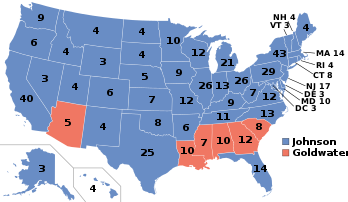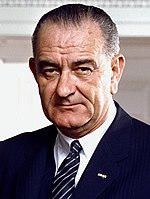
A | B | C | D | E | F | G | H | CH | I | J | K | L | M | N | O | P | Q | R | S | T | U | V | W | X | Y | Z | 0 | 1 | 2 | 3 | 4 | 5 | 6 | 7 | 8 | 9
| |||||||||||||||||||||||||||||
538 members of the Electoral College 270 electoral votes needed to win | |||||||||||||||||||||||||||||
|---|---|---|---|---|---|---|---|---|---|---|---|---|---|---|---|---|---|---|---|---|---|---|---|---|---|---|---|---|---|
| Turnout | 62.8%[1] | ||||||||||||||||||||||||||||
| |||||||||||||||||||||||||||||
 Presidential election results map. Blue denotes states won by Johnson/Humphrey and red denotes those won by Goldwater/Miller. Numbers indicate electoral votes cast by each state. | |||||||||||||||||||||||||||||
| |||||||||||||||||||||||||||||
The 1964 United States presidential election was the 45th quadrennial presidential election. It was held on Tuesday, November 3, 1964. Incumbent Democratic President Lyndon B. Johnson defeated Republican Senator Barry Goldwater in a landslide victory. Johnson was the fourth and most recent vice president to succeed the presidency following the death of his predecessor and win a full term in his own right. Johnson won the largest share of the popular vote for the Democratic Party in history, 61.1%, and the highest for any candidate since the advent of widespread popular elections in 1824.
Johnson took office on November 22, 1963, following the assassination of John F. Kennedy, and generally continued his predecessor's policies, except with greater emphasis on civil rights. He easily defeated a primary challenge from segregationist Alabama Governor George Wallace to win the nomination. At the 1964 Democratic National Convention, Johnson selected liberal Minnesota Senator Hubert Humphrey as his running mate. In the narrow Republican contest, conservative Arizona Senator Barry Goldwater defeated liberal New York Governor Nelson Rockefeller and Pennsylvania Governor William Scranton.
Johnson championed a series of anti-poverty programs, collectively known as Great Society, and his passage of the Civil Rights Act of 1964. Goldwater espoused a low-tax, small-government philosophy with an aggressive foreign policy. Although he personally opposed segregation and previously supported the Civil Rights Act of 1957 and 1960, Goldwater opposed the Civil Rights Act of 1964, saying it was unconstitutional. Democrats successfully portrayed Goldwater as a dangerous extremist, most infamously in the "Daisy" television advertisement. The Republicans were divided between its moderate and conservative factions, with Rockefeller and other moderate party leaders refusing to campaign for Goldwater. Johnson led by wide margins in all polls during the campaign.
Johnson carried 44 states and the District of Columbia, which voted for the first time in this election. Goldwater won his home state and swept the five states of the Deep South, due to the Democratic Party's strong support of civil rights and desegregation. Several southern states had not voted for a Republican presidential candidate since the end of Reconstruction in 1877. This was the last election in which the Democratic Party won a majority of the white vote, with 59% of white voters shunning Goldwater for Johnson. This was the last election in which the Democratic nominee carried Idaho, Utah, Wyoming, North Dakota, South Dakota, Nebraska[a], Kansas, or Oklahoma, and the only election ever in which the Democrat carried Alaska. This marked the first presidential election in history in which a Democrat carried Vermont, and conversely, the first in which a Republican carried Georgia. This was also the last election until 1992 in which the Democrat carried California, Colorado, Illinois, Montana, Nevada, New Mexico, New Jersey, New Hampshire, or Vermont, as well as the last election until 2008 in which the Democrat carried Virginia or Indiana. As such, this was the most recent presidential election in which the entire Midwestern region voted Democratic. As of 2024, this marks the last time that a Democratic presidential candidate has won more than 400 electoral votes.
Assassination of President John F. Kennedy

President Kennedy was assassinated on November 22, 1963, in Dallas, Texas, immediately followed by Vice President Lyndon B. Johnson's succession to the presidency.
Americans were shocked and saddened by the loss of the charismatic President Kennedy, while opposing candidates were put in the awkward position of running against the policies of a slain and popular political figure.[2]
During the following period of mourning, Republican leaders called for a political moratorium, so as not to appear disrespectful.[3][4] As such, little politicking was done by the candidates of either major party until January 1964, when the primary season officially began.[5] At the time, most political pundits saw Kennedy's assassination as leaving the nation politically unsettled.[2]
Nominations
Democratic Party
 | |||||||||||||||||||||||||||||
| Lyndon B. Johnson | Hubert Humphrey | ||||||||||||||||||||||||||||
|---|---|---|---|---|---|---|---|---|---|---|---|---|---|---|---|---|---|---|---|---|---|---|---|---|---|---|---|---|---|
| for President | for Vice President | ||||||||||||||||||||||||||||

|
 | ||||||||||||||||||||||||||||
| 36th President of the United States (1963–1969) |
U.S. Senator from Minnesota (1949–1964) | ||||||||||||||||||||||||||||
| Campaign | |||||||||||||||||||||||||||||

| |||||||||||||||||||||||||||||
Candidates
Until around the time of the Convention President Johnson insisted that he was undecided about seeking a second term, leading supporters in primaries to either write him in as a candidate or vote for Favourite sons. All of these “favourite sons” ultimately endorsed Johnson. This led to Johnson ultimately receiving 88.41% of the vote through his surrogates despite formally receiving only 17.8% of the vote.
The only candidate other than President Johnson to actively campaign was then-Alabama Governor George Wallace, who ran in a number of northern primaries, though his candidacy was geared more towards promoting the philosophy of states' rights among a northern audience; while expecting some support from delegations in the South, Wallace was certain that he was not in contention for the Democratic nomination.[6]
The Mississippi Delegation
At the national convention, the integrated Mississippi Freedom Democratic Party (MFDP) claimed the seats for delegates for Mississippi, not on the grounds of Party rules, but because the official Mississippi delegation had been elected by a white primary system. The national party's liberal leaders supported an even division of the seats between the two Mississippi delegations; Johnson was concerned that, while the regular Democrats of Mississippi would probably vote for Goldwater anyway, rejecting them would lose him the South. Eventually, Hubert Humphrey, Walter Reuther, and the black civil rights leaders, including Roy Wilkins, Martin Luther King Jr., and Bayard Rustin, worked out a compromise: The MFDP took two seats; the regular Mississippi delegation was required to pledge to support the party ticket; and no future Democratic convention would accept a delegation chosen by a discriminatory poll. Joseph L. Rauh Jr., the MFDP's lawyer, initially refused this deal, but they eventually took their seats. Many white delegates from Mississippi and Alabama refused to sign any pledge, and left the convention; and many young civil rights workers were offended by any compromise.[7] Johnson biographers Rowland Evans and Robert Novak claim that the MFDP fell under the influence of "black radicals" and rejected their seats.[8] Johnson would later lose Louisiana, Alabama, Mississippi, Georgia, and South Carolina in the general election.
Vice-Presidential selection
Johnson also faced trouble from Robert F. Kennedy, President Kennedy's younger brother and the U.S. Attorney General. Kennedy and Johnson's relationship was troubled from the time Robert Kennedy was a Senate staffer. Then-Majority Leader Johnson surmised that Kennedy's hostility was the direct result of the fact that Johnson frequently recounted a story that embarrassed Kennedy's father, Joseph P. Kennedy, the ambassador to the United Kingdom. According to his recounting, Johnson and President Franklin D. Roosevelt misled the ambassador, upon a return visit to the United States, to believe that Roosevelt wished to meet in Washington for friendly purposes; in fact, Roosevelt planned to — and did — fire the ambassador, due to the ambassador's well publicized views.[9] The Johnson–Kennedy hostility was rendered mutual in the 1960 primaries and the 1960 Democratic National Convention, when Robert Kennedy had tried to prevent Johnson from becoming his brother's running mate, a move that deeply embittered both men.
In early 1964, despite his personal animosity for the president, Kennedy had tried to force Johnson to accept him as his running mate. Johnson eliminated this threat by announcing that none of his cabinet members would be considered for second place on the Democratic ticket. Johnson also became concerned that Kennedy might use his scheduled speech at the 1964 Democratic Convention to create a groundswell of emotion among the delegates to make him Johnson's running mate; he prevented this by deliberately scheduling Kennedy's speech on the last day of the convention, after his running mate had already been chosen. Shortly after the 1964 Democratic Convention, Kennedy decided to leave Johnson's cabinet and run for the U.S. Senate in New York; he won the general election in November. Johnson chose United States Senator Hubert Humphrey from Minnesota, a liberal and civil rights activist, as his running mate.
Republican Party
 | |||||||||||||||||||||||||||||
| Barry Goldwater | William E. Miller | ||||||||||||||||||||||||||||
|---|---|---|---|---|---|---|---|---|---|---|---|---|---|---|---|---|---|---|---|---|---|---|---|---|---|---|---|---|---|
| for President | for Vice President | ||||||||||||||||||||||||||||
 |
 | ||||||||||||||||||||||||||||
| U.S. Senator from Arizona (1953–1965, 1969–1987) |
U.S. Representative from New York (1951–1965) | ||||||||||||||||||||||||||||
| Campaign | |||||||||||||||||||||||||||||

| |||||||||||||||||||||||||||||
















